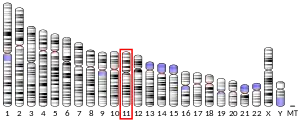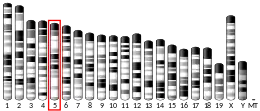Zinc finger bed-type containing 5
Zinc finger BED-type containing 5 is a protein that in humans is encoded by the ZBED5 gene. [5]
| ZBED5 | |||||||||||||||||||||||||
|---|---|---|---|---|---|---|---|---|---|---|---|---|---|---|---|---|---|---|---|---|---|---|---|---|---|
| Identifiers | |||||||||||||||||||||||||
| Aliases | ZBED5, Buster1, zinc finger BED-type containing 5 | ||||||||||||||||||||||||
| External IDs | OMIM: 615251 MGI: 1919220 HomoloGene: 84838 GeneCards: ZBED5 | ||||||||||||||||||||||||
| |||||||||||||||||||||||||
| |||||||||||||||||||||||||
| |||||||||||||||||||||||||
| Orthologs | |||||||||||||||||||||||||
| Species | Human | Mouse | |||||||||||||||||||||||
| Entrez | |||||||||||||||||||||||||
| Ensembl | |||||||||||||||||||||||||
| UniProt |
| ||||||||||||||||||||||||
| RefSeq (mRNA) | |||||||||||||||||||||||||
| RefSeq (protein) |
| ||||||||||||||||||||||||
| Location (UCSC) | Chr 11: 10.81 – 10.86 Mb | Chr 5: 129.9 – 129.9 Mb | |||||||||||||||||||||||
| PubMed search | [3] | [4] | |||||||||||||||||||||||
| Wikidata | |||||||||||||||||||||||||
| |||||||||||||||||||||||||
Function
This gene is unusual in that its coding sequence is mostly derived from Charlie-like DNA transposon; however, it does not appear to be an active DNA transposon as it is not flanked by terminal inverted repeats. The encoded protein is conserved among the mammalian Laurasiatheria branch. Multiple alternatively spliced variants, encoding the same protein, have been identified.
See also
References
- GRCh38: Ensembl release 89: ENSG00000236287 - Ensembl, May 2017
- GRCm38: Ensembl release 89: ENSMUSG00000034173 - Ensembl, May 2017
- "Human PubMed Reference:". National Center for Biotechnology Information, U.S. National Library of Medicine.
- "Mouse PubMed Reference:". National Center for Biotechnology Information, U.S. National Library of Medicine.
- "Entrez Gene: Zinc finger BED-type containing 5". Retrieved 2016-11-07.
Further reading
- Rose JE, Behm FM, Drgon T, Johnson C, Uhl GR (2010). "Personalized smoking cessation: interactions between nicotine dose, dependence and quit-success genotype score". Mol. Med. 16 (7–8): 247–53. doi:10.2119/molmed.2009.00159. PMC 2896464. PMID 20379614.
This article incorporates text from the United States National Library of Medicine, which is in the public domain.
This article is issued from Wikipedia. The text is licensed under Creative Commons - Attribution - Sharealike. Additional terms may apply for the media files.



